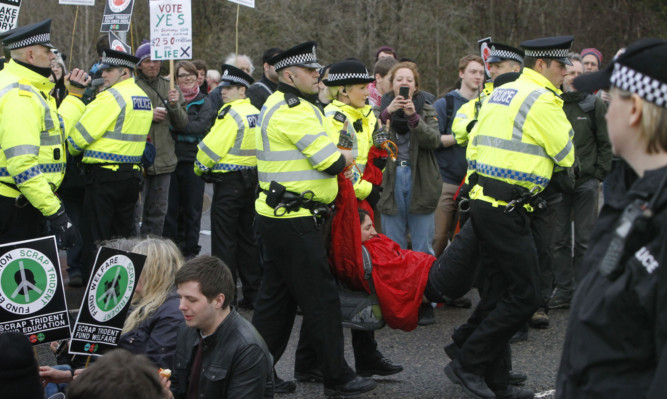Police have arrested 47 people protesting outside a naval base where nuclear weapons are stored.
Campaigners have chained themselves to each other and are blocking the entrance of the Faslane base in Argyll, the home of the UK’s Trident nuclear weapons.
The Scrap Trident coalition wants Scotland to be allowed to “lead the way to a world free of nuclear weapons” and more than 100 of its supporters are demonstrating outside the base.
Around 20 people, in pairs or in groups of three, chained their arms together inside sections of drain pipes and other plastic tubing and lay down on the road in front of the north gate at Faslane, while eight other people did the same at the south gate.
Police issued a warning to the group at the north gate then officers started using cutting equipment to separate them.
A total of 47 people were arrested five hours into the protest. The 32 women and 15 men have been charged with alleged offences such as breach of the peace and resisting arrest, police said.
The blockade follows a weekend of action calling on the UK Government to scrap Trident and use its budget to fund welfare, education and health instead.
Organisers said disability rights campaigners, students, pensioners, trade unionists and environmentalists are taking part in the protest which started at 7am after a convoy of buses brought people to the site.
Nicole MacLean, a student from Falkirk, chained herself to Zach Hampstead, 24.
“We want to set a precedent for other countries,” she said.
“I know it’s hard with nuclear to give it up but if we’ve got people behind supporting it, saying this is what we want, I think it sends a positive message to the world to get rid of nuclear weapons.”
Jamila Haidar-Al-Amin, 36, travelled from her home in Manchester with her two-year-old son Raphael to take part in the weekend of protests.
She said she was motivated by her family’s roots in Iraq to join the campaign against nuclear weapons.
“I have family that live in Iraq and my husband is Lebanese, so I have seen first-hand what weapons from this country are doing, where they are going and the havoc they are creating in the Middle East,” Ms Haidar-Amin said.
“Most of my family have had to leave Iraq over the past few years. They’ve become refugees all over the world.”
Leonna O’Neill, 27, has lived in the Faslane peace camp for the last two-and-a-half years and helped organise the blockade.
“By building up to this we show people they can actually affect the situation and put their bodies in the way of these weapons. We don’t have to be complicit,” she said.
“I think Parliament needs a bit of a push and certainly there needs to be a much bigger mass movement of people. And it’s been a long time since there was a blockade like this at Faslane, so we’re starting again from scratch.”
Further similar events are planned in the near future, Ms O’Neill suggested.
Patrick Harvie, Green MSP for Glasgow, was also at the protest.
He said: “We’re actually finally on the verge of being able to do something about it. If Scotland decides next year to take control of its own defence and foreign affairs policy, we will be able at last to consign Trident to history and make Scotland a force for peace in the world.
“David Cameron has been quite shameless in milking the situation on the Korean peninsula in terms of the Trident debate.
“Most people clearly know that North Korea does not pose a direct threat to the UK at present and even if it did, Trident as a response to that is a weapon which is only capable of the mass slaughter of innocent people.
“It is not something that would be morally defensible to use.”
The Faslane blockade is one of more than 100 protests in dozens of countries in what is a global day of action against military spending.
